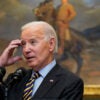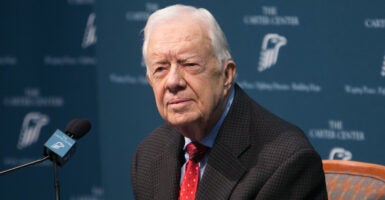History remembers Jimmy Carter’s post-presidency more kindly than his presidency for a host of reasons. One could certainly be that as president, Carter didn’t champion election integrity laws–but reforms such as voter ID are nevertheless a lasting part of his legacy.
It was 1977 when a young senator of Carter’s own party–Joe Biden–explained his opposition to a Carter proposal to allow Election Day voter registration. The first-term Delaware Democrat proclaimed, a “reservation I have and one that is apparently shared by some of the top officials within the Department of Justice is that the president’s proposal could lead to a serious increase in vote fraud.”
But in 2005, Carter, the 39th president who died Sunday at age 100, teamed up with former Republican Secretary of State James Baker to issue 87 recommendations from the 2005 report of the bipartisan Commission on Federal Election Reform, known informally as the Carter-Baker Commission.
The report called for adopting national voter ID, clearing the names of dead people from voter registration lists, restricting ballot harvesting, and for allowing election observers at polling sites. The report was also skeptical of mail-in voting.
Such suggestions today would almost certainly prompt Carter’s fellow Democrats to accuse him of “voter suppression” or “Jim Crow 2.0.”
Yet, in 2005, the Carter-Baker Commission report enjoyed broad bipartisan consensus. As I noted in my book, “The Myth of Voter Suppression,” Congress largely ignored the suggestions of the bipartisan commission, but mostly Republican state legislatures began enacting the reforms in 2011. In 2021, state lawmakers–including in Carter’s home state of Georgia–enacted sweeping election reforms that largely echoed the Carter-Baker suggestions. These included restrictions on ballot harvesting and extending voter ID to mail-in voting.
“To ensure that persons presenting themselves at the polling place are the ones on the registration list, the Commission recommends that states require voters to use the REAL ID card, which was mandated in a law signed by the President in May 2005,” the final report of the Carter-Baker Commission says.
The report continued: “The electoral system cannot inspire public confidence if no safeguards exist to deter or detect fraud or to confirm the identity of voters. Photo IDs currently are needed to board a plane, enter federal buildings, and cash a check. Voting is equally important.”
Democrats such as former Georgia lawmaker Stacey Abrams, then-House Speaker Nancy Pelosi, and Biden who had become president, called the laws “Jim Crow 2.0.” Biden specifically called a 2021 Georgia law “Jim Eagle.”
The report also warns against what today is commonly known as “ballot harvesting.” This is the practice of political operatives distributing and collecting large numbers of ballots.
“State and local jurisdictions should prohibit a person from handling absentee ballots other than the voter, an acknowledged family member, the U.S. Postal Service, or other legitimate shipper, or election officials,” the Carter-Baker report says. “The practice in some states of allowing candidates or party workers to pick up and deliver absentee ballots should be eliminated.”
Carter and his Carter Center had long advocated for election observers in burgeoning democracies across the world. The Carter-Baker report similarly suggested election observers for domestic elections.
“All legitimate domestic and international election observers should be granted unrestricted access to the election process, provided that they accept election rules, do not interfere with the electoral process, and respect the secrecy of the ballot,” the report says.
However, in 2021, Democrats–including Biden–claimed a Texas reform law would allow partisan poll watchers to intimidate voters and imperil poll workers because the Texas law granted “free movement” for partisan poll watchers at polling places as long as it’s not in the voting booth. The Texas law primarily made it a crime for an election worker in Texas to obstruct the view of a poll watcher. In reality, observers are appointed by both parties to view voting and counting of ballots, and must be pre-certified and legally approved.
The inclusion of the names of ineligible voters on the voter rolls represented an “invitation to fraud,” the report says.
Previously the National Voter Registration Act of 1993 and the Help America Vote Act of 2000 called for clean voter rolls. But the 2005 Carter-Baker report also called for removing from the rolls the names of dead people and those who moved out of a voting jurisdiction.
“Invalid voter files, which contain ineligible, duplicate, fictional, or deceased voters, are an invitation to fraud,” according to the report. “In order to assure that lists take account of citizens moving from one state to another, voter databases should be made interoperable between states.”
The report noted, “Absentee ballots remain the largest source of potential voter fraud.”
However, during the 2020 COVID-19 pandemic, after frequent references to the 2005 report, Carter issued a statement saying, “I urge political leaders across the country to take immediate steps to expand vote-by-mail and other measures that can help protect the core of American democracy—the right of our citizens to vote.”
Notably, Carter didn’t endorse universal mail-in voting, which congressional Democrats championed in a 2021 bill, H.R. 1, dubbed “For the People Act.”
Many of the non-controversial suggestions supported by the former Democratic president in 2005 would be fiercely opposed and outright smeared by his own party years later.
Ironically, it was Republican state lawmakers who enacted the election reforms Cater supported–along with Baker. Such reforms are part of Carter’s post-presidency policy legacy.






























